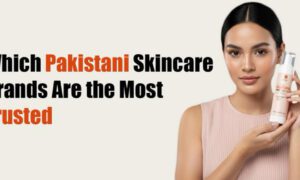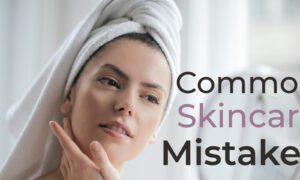According to Business wire, the global market for Physician Dispensed Cosmeceuticals is projected to reach US$37.3 Billion by 2030, growing at a CAGR of 9.5% over the analysis period 2022-2030. This is the fastest growing segment of the skincare market. But why do people prefer buying skin care from their doctor? Because they want to make sure they get the proper products. Using the wrong skincare products can hurt skin health and waste time and money. The problem is- not everyone has access to a dermatologist. Will AI assisted skincare recommendations online replace dermatologists? Dermatologists seem to agree on these points: Skin type matters when prescribing a personalized skincare routine and cameras used to take an image a prescribe a skincare routine are not accurate enough to diagnose skin issues such as sensitivity and tendency for hyperpigmentation.
Cameras are not accurate enough to prescribe custom skincare routines
When cameras are used in FDA research trials to show before and after images, the lighting, focal length, camera angle, face placement, and facial expression are all standardized so that many variables are eliminated. The makeup is completely removed and the images are taken on exact days such as Day 0, Day 30 and Day 60. When images are taken on the cell phone, there is variation in the camera angle, lighting, and color vibrancy that make the results difficult to interpret.
Even if photos of the face could be standardized, are still not accurate in diagnosing skin type. This is because many features that distinguish skin type depend on historical data such as: Have you ever had a rash from a skin care product, how much sun exposure have had, how does your skin react in different situations. An image is just one point in time. It may not capture an acne breakout or facial redness and flushing, and it certainly cannot perceive if the skin itches, burns or feels rough and tight. Cameras can measure hyperpigmentation, but they do not do a good job of capturing fine lines and wrinkles. Cameras can be used to help diagnose skin type, but in leu of a dermatologic diagnosis, a validated questionnaire to diagnose skin type will always be preferred. If you do not have a dermatologist and want to get a custom skincare routine, there are many options online for custom skin care, but these options are not beneficial if a correct skin type diagnosis is not made.
Most skin care routine quizzes are not accurate
Questionnaire science is so complicated ad precise that there are PhDs in questionnaire science who spend years perfecting the science of measuring outcomes using questions. You have to make sure that the question really measures what you want to measure. So for example- “Do you have any dark spots on your skin?” does not tell you that a patient wants skin lightening treatments in their skin care routine. It only tells you that they have dark areas like melasma or freckles on the skin. A more accurate question when developing a skin care routine would be “Do you have any dark spots on the skin that you want to lighten?” This is a more accurate way of determining if they need skin lightening treatments in their skin care routine. So.-The wording of the questions makes a big difference in how meaningful the skin type quiz is.
Another example is skin oiliness. Many studies show that when you ask someone if their skin is oily or dry, they are often incorrect. The perception of skin oiliness can be affected by temperature and humidity and preconceived ideas and self-perception of skin oiliness often does not correlate with sebum secretion. We spoke to skincare expert Dermatologist Dr. Leslie Baumann MD, FAAD who has spent the last 25 years studying skin types and how they respond to various skin care routines. “I spent years developing a skin type quiz that will accurate predict sebum production, skin sensitivity, and the need for skin lightening and anti-aging ingredients. The most difficult part of developing the Baumann Skin Type Indicator Skin Type Quiz that dermatologists use to diagnose skin type were the questions to determine skin oiliness. I spent years looking at sebum secretion rates and how they compare to different questions and finally was able to validate a series of questions to diagnose if skin is oily or dry. This has been a game changer is skin care routine customization because sebum secretion and barrier integrity both must be addressed by cleansers, serums, moisturizer, and sunscreens in a skin care routine. It also matters for compliance because if you give an oily skin type a sunscreen that feels too greasy- they will not use it. Skin Type is so important for designing a custom personalized skin care routine that I devised a 16 Baumann Skin Type system that is now found in dermatology textbooks ,and used around the world.”,
The Best Skin Typing System To Customize Skin Care Routines
The Baumann Skin Typing System is composed of 16 skin types based on the presence or absence of these 4 barriers to skin health:
- Dehydration and sebum production
- Inflammation and susceptibility to sensitivity
- Presence of hyperpigmentation and uneven skin tone
- Skin aging risk factors
These 4 issues are combined into 16 Baumann Skin Types. “It is important to take the skin type quiz to diagnose the skin type, because guessing can lead to an incorrect diagnosis.” Dr. Baumann emphasizes.
Custom Skincare Routines in the Age of Artificial Intelligence
It won’t be long until augmented AI is used to provide personalized skin care routines. But for these to be accurate, the skin type must be properly diagnosed, and the products must be tested on all of the 16 Baumann Skin Types to show they work. Products in a skin care routine can interact with each other so the order of skin care products, the ingredients in the products, and the skin type all must be taken into account when customizing a skincare routine. This is very complicated. “It takes 40,000 different skin care routine templates to cover all 16 Baumann Skin Types. When you consider how many skin care brands there are, and all of the possibilities of combining products from different brands, the numbers of skincare routine outcomes are staggering.” Baumann says. “This is where augmented AI comes in. Once you have a correct Baumann Skin Type diagnosis, routine templates, and strict rules for what ingredients can and cannot be in each product of each step of the routine, this infrastructure can be used in machine learning. It took me 15 years to develop and test this infrastructure with the help of dermatologists across the world “ Baumann explained in her talk on using artificial intelligence to generate personalized skin care routines. at the Annual Meeting of the Society of Cosmetic chemists in 2012 .,
How to find the best custom personalized skincare routines
The biggest trend in skincare is customed skincare routines, but most of these custom routines are provided by skincare brands and only include recommendations for one skincare brand. To have the best skincare routine for your skin type, you may need to combine products from different brands or with prescription medications. Only Skin Type Solutions personalizes skin care routines by combining products from different medical grade skin care brands together and gives step by step instructions. Most recommended skincare routines concentrate on one skin problem such as acne. Curology® is an example if this. But a skin care routine for an oily, acne-prone skin type with aging and dark spots from pimples is very different than a skin care routine for a dry, acne-prone skin type that has aging skin concerns. Focusing on only one skin concern can worsen skin health by ignoring underlying issues like dehydration and inflammation. For example, if you have rosacea and your skin gets red easily, many skin lightening and antiaging treatments can irritate skin and worsen rosacea. Increasing inflammation by using the wrong skincare products can lead to more aging and hyperpigmentation. So- it is critical that a skincare routine addresses all barriers to skin health.
In summary- AI generated skincare routines are coming. Make sure you do not use one a skincare routine builder based on nonscientific parameters such as your age, demographic, income, and previous purchasing patterns. This data does not help diagnosis skin type or give any insights into what products are best. If you do not have a dermatologist but want a dermatologist-recommended custom skincare routine – check out SkinTypeSolutions.com.




































